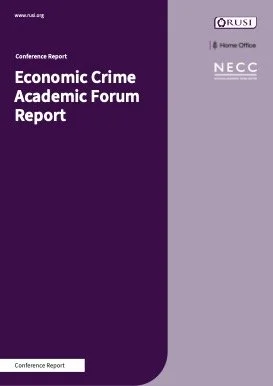By Rusi - Royal United Services Institute for Defence and Security Studies
Economic crime poses a significant threat to the UK, undermining its financial stability and security. To address this threat, in March 2023, the UK government launched the Economic Crime Plan 2,1 outlining a series of coordinated actions that should be undertaken across multiple government departments. Among these measures, the National Economic Crime Centre (NECC) was tasked with developing a people strategy to strengthen expertise and cross-sector collaboration, considering partnerships with industry and other stakeholders such as academia.2 Although there is a growing body of research on economic crime in the UK, there is scope for academia to play a more important role as a valuable resource in combatting economic crime. In October 2024, the NECC and the Home Office convened the first Economic Crime Academic Forum, hosted by RUSI’s Centre for Finance and Security. The forum aimed to bridge the gap between academic research and policymaking by fostering dialogue and identifying actionable solutions to issues including money laundering, fraud, kleptocracy and corruption. Academic participants came from a range of related disciplines and included both more established and early career academics, bringing a range of perspectives. Government attendees came from multiple government departments and law enforcement. The discussions focused on three aspects of research on economic crime: economic crime threats; the response to economic crime in terms of policy, enforcement and evaluation; and research methods and associated challenges. Due to the breadth and fluidity of the discussion, this report does not provide a linear summary of the matters raised. Instead, it details ways in which academics conduct research on economic crime, identifies gaps and challenges in research and academic engagement with government initiatives, and explores potential solutions. The forum was conducted on a non-attributable basis.
London: Royal United Services Institute for Defence and Security Studies (RUSI), 2025. 11p



